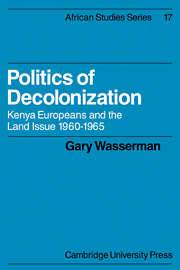Book contents
- Frontmatter
- Contents
- Dedication
- Acknowledgments
- Map
- Introduction: Kenya as a case study
- 1 Consensual decolonization: conditions, process, and the salient aspects of the Kenyan case
- 2 Background to decolonization: trends and groups in the European community
- 3 1960, initiating the bargain: the lobbying on the land issue and the dividing of the European community
- 4 1961, negotiating the bargain: accelerating the bargaining, deepening the divisions
- 5 1962, making the bargain: the resolution of the land issue and the dissolution of the European groups
- 6 1960–1970, sealing the bargain: the implementation of the Kenya land transfer schemes
- 7 Conclusion: Europeans, land and decolonization
- Notes
- Selected bibliography
- Index
3 - 1960, initiating the bargain: the lobbying on the land issue and the dividing of the European community
Published online by Cambridge University Press: 04 August 2010
- Frontmatter
- Contents
- Dedication
- Acknowledgments
- Map
- Introduction: Kenya as a case study
- 1 Consensual decolonization: conditions, process, and the salient aspects of the Kenyan case
- 2 Background to decolonization: trends and groups in the European community
- 3 1960, initiating the bargain: the lobbying on the land issue and the dividing of the European community
- 4 1961, negotiating the bargain: accelerating the bargaining, deepening the divisions
- 5 1962, making the bargain: the resolution of the land issue and the dissolution of the European groups
- 6 1960–1970, sealing the bargain: the implementation of the Kenya land transfer schemes
- 7 Conclusion: Europeans, land and decolonization
- Notes
- Selected bibliography
- Index
Summary
Factions arise when the environment provides some new kind of political resource which existing groups cannot exploit.
Lucy MairMan is a political animal only by education; he is a racial animal by birth.
H. V. HodsonWhen someone steals your ox, it is killed and roasted and eaten. One can forget. When someone steals your land, especially if nearby, one can never forget. It is always there …
Ex Senior-Chief KoinangeIn the aftermath of the First Lancaster House Conference the European community tentatively attempted to reorganize itself and reformulate its policies. All the groups involved appeared to have underestimated the effects of the Conference in establishing African majority rule. Michael Blundell was told by high British officials that independence remained a decade away, and remarked in May 1960 that independence was much further off than most people thought. Iain Macleod later attested to his surprise at how rapidly Kenya had obtained independence. The leaders of the New Kenya Group three months after the Conference expected to be able to win the coming election and dominate the interim government. The nationalists, as witnessed by their concentration on rapid devolution, still expected the colonial government to pull the rug from under them. The thoroughly disillusioned conservatives, who found their worst fears realized, were closest to the mark in foreseeing Britain's rapid transfer of colonial authority.
- Type
- Chapter
- Information
- Politics of DecolonizationKenya Europeans and the Land Issue 1960–1965, pp. 46 - 74Publisher: Cambridge University PressPrint publication year: 1976

